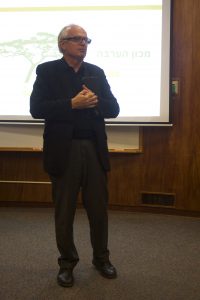 Two speakers from the Arava Institute for Environmental Studies visited Brandeis Monday, March 23 for the Brandeis Zionist Alliance (BZA) and Students for Environmental Action collaboration event “Cooperation through the Environment.”
Two speakers from the Arava Institute for Environmental Studies visited Brandeis Monday, March 23 for the Brandeis Zionist Alliance (BZA) and Students for Environmental Action collaboration event “Cooperation through the Environment.”
Daniel Shek, former Israeli ambassador to France and chair of the public council for the Arava Institute and Clive Lipchin, director of the Institute’s Center for Transboundary Water Management discussed environmental challenges that the Middle East is facing.
The Arava Institute, an academic institution located on Kibbutz Ketura in southern Israel, allows students from around the world to examine pressing environmental issues in the Middle East. The Institute is partnered with the Jewish National Fund (JNF), which works with the Institute on fundraising and various projects and aided in organizing Monday’s event.
BZA President Tzlil Levy ’17 and SEA Vice President Jay Feinstein ’17 gave introductions. Feinstein discussed SEA’s initiatives to promote sustainability on campus and Levy introduced the event. Student Union President Sneha Walia ’15 also spoke, discussing her experiences on a JNF mission for non-Jewish student leaders to Israel whereupon she visited several JNF sustainability projects.
Shek discussed the layered peacebuilding process. The first, crucial layer, according to Shek, is the “government-to-government element of official talks … driven by political will to try and overcome a conflict.” Drawing on the Israeli-Palestinian conflict, he stressed that this process is difficult and agreements are always subject to change.
Shek then introduced the layer of “people-to-people processes,” conversations between individuals or entities on all side of conflict. He believes these discussions promote valuable communication between those often considered enemies.
“You can find areas of common interest. It tends to alter in your mind the way you consider the whole big picture. It’s much easier to hate a stereotype than to hate an actual person,” said Shek.
He laments, however, that in the absence of official negotiations, “people-to-people” negotiations have faltered. At this point, Shek described the Institute, its role in continuing discussion through programs and research and its regional approach to problem solving.
“One of the favorite slogans of environmental groups is to say that nature has no borders, but usually it’s just a slogan,” said Shek, however he believes the Institute goes further, seeking to include people from many nations in its work.
Shek praised the collaborative nature of the Institute’s programs, with students living together, working in study groups and going on field trips. Shek cites Arava as “living proof that people from these countries and from this area can find a way to coexist and be productive in a respectful way.”
Lipchin focused his talk on water sanitation and transboundary water management. He explained that these issues are a major part of Israeli-Palestinian debate, though simultaneously the water sector provides an example of productive cooperation.
“What we do at the Institute is promote sustainable regional water management solutions for the benefit of everybody in the region,” said Lipchin. “We feel that’s the best way to manage the scarce water resources of our region, but also if we can solve the water crisis … it can also provide a foundation to promote the larger sort of … peace agreement.” These discussions build trust, Lipchin explained.
Currently the Arava Institute is working to address sewage and wastewater management as it flows from the West Bank toward the Mediterranean Sea, including a project with JNF in the Besor-Hebron Sheva stream. Lipchin illustrated the gravity of the situation through data and photographs of a heavily polluted stream, contaminated with industrial sewage and slurry from stone cutting.
He discussed several barriers impeding improvements. Lipchin stated Israel’s capacity to manage sewage or reuse wastewater for irrigation is far greater than Palestine’s. He explained the difficulty of organizing cleanup when sewage travels from Palestine to Israel, due to the lack of communication, and illustrated problems that arise due to territory fragmentation in the West Bank which would force Israeli and Palestinian governments to engage in order to establish a wastewater treatment plant.
With Arava, Lipchin is currently pursuing a watershed based approach, where political borders are less important than hydrological borders, allowing one to address “one ecological system.”
Lipchin stated that one must then encourage everyone who is part of the pollution problem to become part of the solution. He illustrated specific projects the Institute is engaged in, including an effort to make water quality data readily available by placing sensors in water sources to transmit data to a website.
“Having data empowers you. It gives you the ability to try to see what’s going on,” said Lipchin. On Sunday, Lipchin will be featured in the CNN broadcast “Is the Dead Sea Dying?”
The speakers facilitated a question and answer, where participants asked about specifics of Arava’s work and other aspects of the water crisis. Monday’s event was co-sponsored by Hillel at Brandeis, BIPAC and the Brandeis Chapter of Alpha Epsilon Pi.


